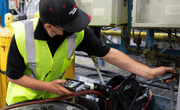Comprehensive Brand Audits & Assessments
Our certified auditors evaluate all major air compressor brands to optimize performance, identify inefficiencies, and recommend cost-saving upgrades for your system. Through detailed analysis of energy consumption, maintenance records, and operational patterns, we uncover opportunities to reduce operating costs by up to 30%. Every audit includes a comprehensive report with prioritized recommendations and ROI calculations.





